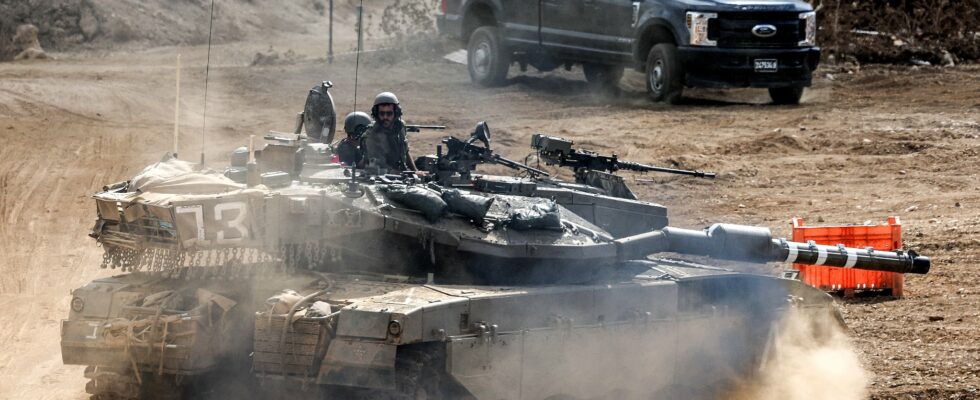Four days after eliminating Hassan Nasrallah, the leader of Hezbollah, Israel announced on Tuesday, October 1, that it had launched a ground offensive targeting the positions of the Islamist militia in southern Lebanon. This action confirms the opening of a new front for the IDF, eleven months after the start of its offensive launched in the Gaza Strip.
“We have not been active enough to fight against Hezbollah, which has allowed it to strengthen over the years and to equip itself with more sophisticated weapons,” said former general Yaakov Amidror, who was the advisor to Benyamin Netanyahu’s national security from 2011 to 2013. “After the war, we will have to be more vigilant in Lebanon,” adds this researcher at the Jerusalem Institute for Strategy and Security, a conservative think tank.
L’Express: What are Israel’s objectives with the land operations launched in southern Lebanon?
Yaakov Amidror: Israel wants to push Hezbollah away from its border, in order to secure the area. Potentially to the north of the Litani River, in southern Lebanon, or at least, along the northern border, over a strip of around ten kilometers deep. There are two reasons for this: the first is to prevent Hezbollah from sending missiles and rockets into Israeli communities living near the border. And, the second, is to prevent this militia from being able to launch its own October 7 from the Lebanese border. Because if we manage to push them back far enough, they will not be able to surprise us and carry out a terrorist action of this type.
These two elements are essential to allow the more than 60,000 displaced Israelis, who were forced to leave their homes because of Hezbollah bombings, to return home. After twelve months, Israel has decided that enough is enough and that we must secure our border. For the moment, this operation is very limited and concerns areas from which Hezbollah can launch short-range rockets into our territory.
How far can Israeli forces advance?
It’s difficult to say, because it will depend a lot on what happens on the ground in the days to come, particularly the resistance put up against Israeli forces. In any case, the operation will continue. We must understand that we can only entrust control of this area to Israeli forces. We learned the hard way that UNIFIL [NDLR : Force intérimaire des Nations unies au Liban, chargée de former une zone tampon entre le Liban et Israël]completely failed in its mission, and absolutely did not prevent Iran from arming Hezbollah in the area. This is why we must secure it, in order to pacify the border with Lebanon.
The other objective concerns the future of Hezbollah. It is a monster that we can no longer afford to let grow in Lebanon. To do this, we must destroy its ability to launch missiles into Israel, so that it cannot threaten us in the future. And in the future, Israel will prevent, by force, any attempt by Iran, or any other actor, to rebuild Hezbollah’s capabilities in Lebanon.
Wasn’t that the case until now?
Not enough, and this was Israel’s greatest strategic mistake. We have not been active enough to fight against Hezbollah, which has allowed it to strengthen over the years and acquire more sophisticated weapons. Conversely, we were in Syria, to prevent Iran from building a Syrian version of this organization there. The grand plan of Iranian General Qassem Soleimani, before being eliminated in 2020, was to build the equivalent of Hezbollah, in Syria, under the direct control of Iran. But our actions managed to prevent it. This should serve as an example for us: after the war, we will have to be more vigilant in Lebanon.
How will Nasrallah’s death affect Hezbollah’s ability to fight?
This man was a true symbol of Hezbollah, of which he had been at the head for 32 years. After the death of Qassem Soleimani, he became one of the most important figures in the “axis of resistance” led by Iran. We were thus able to find members of Hezbollah among the Houthis in Yemen, but also in Iraq, Syria, or Gaza, where they brought their know-how to Hamas. He also had very good relations with Ali Khamenei, the supreme guide of the Islamic Revolution, for whom he was the personal messenger in Lebanon.
For Hezbollah, it is therefore an immense loss. And this came at the end of a process in which we eliminated, in recent months, almost all of Hezbollah’s commanders. Now, can the organization survive them? The answer is yes. Hezbollah will appoint new commanders, and in the future they will continue to target Israel. The threat still exists. Hezbollah is still capable of fighting and has significant capabilities: notably numerous anti-tank missiles, and men on the ground.
After eleven months of combat in Gaza, is the Israeli army still able to fight?
It is true that our forces have been tested by the last months of fighting in Gaza, as have our ammunition stocks. However, it must also be remembered that the Israeli Defense Forces were fundamentally much better prepared for a war against Hezbollah than they were for a war in Gaza. All our military exercises, our preparations and our targeting system have focused on Lebanon in recent years. This has been verified on the ground with the success of the operations carried out over the last two weeks. Losses within our forces are part of the risks of this operation. But if we want freedom and security for the people living in northern Israel, we must be willing to take it.
.
